There is no hoarier cliche in Welsh rugby than that of the mythical fly-half factory, churning out fleet-footed, impish stand-offs, possessed of a uniquely Welsh sense of cunning and guile.
In reality, production of this particular model has slowed in the age of professionalism, to be replaced by an excess of abrasive, dynamic open-side flankers.
But one production line that appears to have slowed to a trickle, is the one manufacturing second row forwards. The slowly dawning realisation that Alun Wyn Jones can’t go on forever, along with the premature departure of Jake Ball and Cory Hill has left the stock room a little bare. Yes, Will Rowlands recently had a coming-of-age Six Nations, but at 30 he’s a late-starter. What of the next generation?
Could it be that the future long-term boiler-room duo aren’t even in Wales, but honing their craft in sun-dappled Devon, under the tutelage of Rob Baxter and the Exeter Chiefs?
After being plucked from obscurity by Wayne Pivac, Christ Tshiunza is no longer an unknown, and if you haven’t heard of his best buddy, Dafydd Jenkins yet, you soon will have. Both are enormously driven, impressively articulate young men with hulking physiques, and wide horizons.
Raised in Cardiff after moving from the Congo at the age of six, Tshiunza was initially bewildered by rugby; an oval ball that was handled rather than kicked seemed “utterly bizarre” to him. Jenkins, on the other hand, was indoctrinated at an early age, encouraged by his father, Hywel – a former Wales A international, and stalwart of both Neath and Swansea. Jenkins Jr’s childhood dream was to pull on the three feathers, and that single-minded determination has consumed him to this point. So their paths to professional rugby may have been wildly different, but they’ve now converged in this part of Devon, and the hype bubbling around them seems entirely justified.
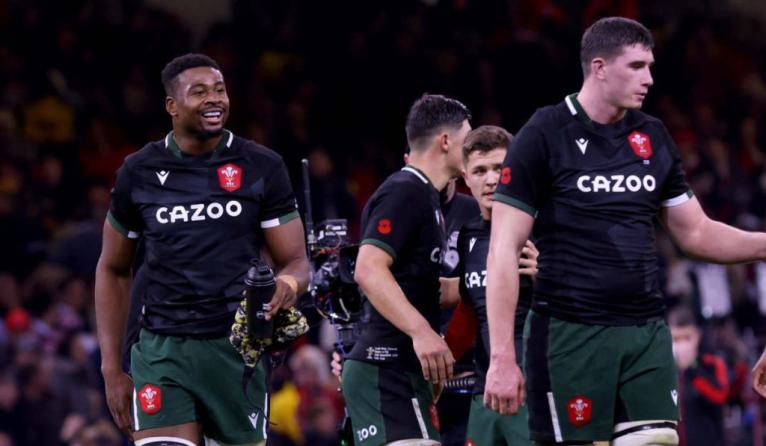
Refreshingly, in the age of the media-controlled cliches, neither baulked at the suggestion they could be Wales’ second-row pairing in the post Alun Wyn era. As Jenkins outlined, “there’s a fine line between confidence and arrogance, but we both know we’re good enough, and if we work hard enough, I feel like we’ll get there as soon as possible.”
Sitting in the shade of the Sandy Park’s west stand, as the sun blazes down on the pitch below, both players grin widely as they recall the moment their fledgling partnership took flight. “Our first game together was for Wales 18s against Scotland about four years ago” says Christ, whose manner throughout is ultra laid back. “It was pretty much the first time I’d met Daf, and we still talk about it almost every day. Everything ran so smoothly, it was almost like we were a machine; one contributing to the other. After the game we looked at each other and said, ‘we’re going to play for Wales together’”.
I remember playing against him for Porthcawl Comp against Whitchurch – I don’t know if he even knows this – and they hammered us, but every time he got the ball I was lining him up trying to smash him
Dafydd Jenkins on his first game against Christ Tshiunza
Jenkins laughs at the memory, agreeing it was a special day, and while it’s the lodestone moment for both of them, he recalls a memory that Christ “probably” doesn’t remember. “Growing up, he was a year above me in school, and I used to target him because I’d think, ‘there can only be one Welsh second row coming through’. Every time I’d see him, I’d target him. I remember playing against him for Porthcawl Comp against Whitchurch – I don’t know if he even knows this – and they hammered us, but every time he got the ball I was lining him up trying to smash him. I keep that one quiet now though, because they won, but when it came to that 18s camp, we got to know each other, and I found my new best friend.”
The two are, in Tshiunza’s words, “very different characters”, who happen to have “very similar goals.” According to Christ, his mate is almost aggressively single-minded, pursuing his rugby ambition at the expense of virtually everything else. “Daf’s been obsessed with rugby all his life. He’s a man who’ll put rugby and line-outs before anything. Rugby before work, rugby before uni work, sleep, eat, he loves rugby.” It’s a marked contrast to Christ’s approach, who admits he’s rather stumbled into it all.

Arriving from French-speaking, football-obsessed Congo at a young age, he’d never even heard of rugby, “it’s a sport that’s really bizarre if you stop and think about it. If you’ve never watched or heard about rugby, and you see it for the first time – people running, passing with their hands, kicking forward, it makes no sense. But the social aspect of it, of going back to the club with the boys after the game, that’s what got me hooked. At first I was just catching the ball and throwing it up in the air. I didn’t know what to do to be honest, but after a while I got OK.”
That last line is delivered with almost comic understatement. A growth spurt when he turned fifteen during the summer holidays during which he “grew a foot almost overnight” made him a valuable asset for his school team, where his tall, rangy physique made him a natural second row. His potential was such that he became the subject of a tug-of-war between Cardiff’s academy (who reportedly offered him their biggest ever deal), and (then European Champions) Exeter Chiefs. But even as his talent was blossoming, his interest remained peripheral at best: “I didn’t even pay much attention to it until I was in the sixth form. It was more something I did for the school rather than for myself. It was like, ‘Chris, we need numbers this week, can you play?’ I was more interested in football at that point, turning out for Whitchurch Rangers on the weekends.”
Playing football, which is a very running-based sport probably helped with my athleticism. Had I played rugby first, I’d probably be a very different second row.
Christ Tshiunza on his circuitous route to Test rugby
Intriguingly, he now contends that his relaxed, almost indifferent approach actually aided his development: “because I didn’t have any expectations to be the best, I didn’t put a lot of pressure on myself, and I think that helped. Playing football, which is a very running-based sport probably helped with my athleticism. Had I played rugby first, I’d probably be a very different second row. There’s not a lot of Maro Itojes; players who can actually run, you know? I wouldn’t be as good or as athletic a player now if I’d played rugby first.”
It’s a fascinating take, and a topical one, after a Six Nations campaign in which Welsh tight-five forwards were compared unfavourably to their opponents when it came to core skills, metres made, and ball-carrying. Plodding cart horses rather than excitable mares. Wayne Pivac’s Scarlets blueprint was based around counter-attack, mobility, and lung-busting enterprise. Skilful, dexterous forwards were a key part of the philosophy, and Tshiunza’s innate talent and awareness of space – honed on the football pitch – seem ripe for the formula. If Pivac is ever able to transfer the template to the test arena, Tshiunza is exactly the type of player he needs. It’s this free-spirited approach that helps him dovetail with the more nuts-and-bolts attitude of Jenkins.
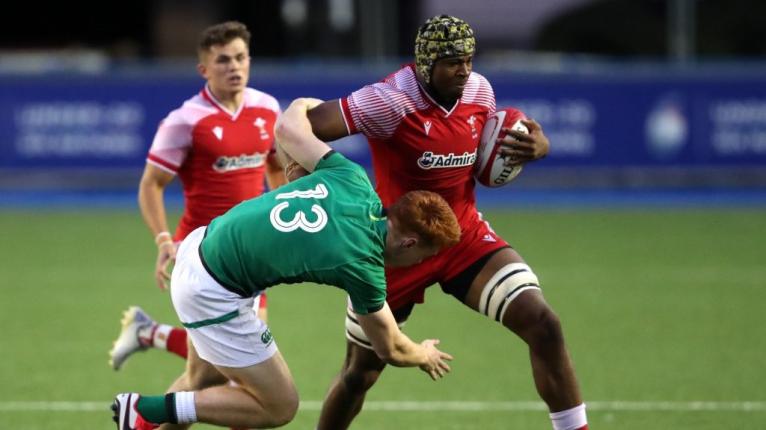
“He’s more set-piece oriented, whereas I’m more ‘open-field’”, Tshiunza explains, “which is where we go hand in hand. He can focus on the set piece knowing that I’ll help him in that. He knows I’m the better carrier – well, I think I am – so, he knows I’m there for him to tip on to.” Dafydd elaborates: “Chris could do stuff that no other player our age could. If I was looking for him to carry, I would just tip him the ball and give it early. I know his strengths and he knows mine and that’s why we gel so well. I won’t try and be him and he won’t try to be me. We also know each other’s weaknesses which is important as well. We’re not scared to pull each other up on things. I’ve only been here a year but I feel comfortable telling him when something’s not good enough, and he feels the same.”
When talk returns to potential vacancies at test level, there is, as Christ acknowledges with a grin, “a gap in the market”. Daf adds that their closeness to one another has allowed them to further finesse their partnership. “Because we’re at the same club, we can go through it together, almost like a Kruis and Itoje sort of thing.” He name-checks Will Rowlands and Ben Carter as fine players currently ahead of them in the pecking order, and emphasises that fulfilling their own destinies is more about hard graft than burgeoning reputations. “If we just think we’re gonna do it, it won’t happen. We’ve just got to keep pushing and being down here has helped to keep the hunger strong. We’re always trying to chase that first team place, and that’s only going to make you look good if hopefully Pivac’s watching.”
Fortunately I’ve got not bad genes. I’ve got that leeway in my diet where I can eat a bit of what I want. I’m still in decent shape considering I haven’t run or done any cardio for three months
Christ Tshiunza
Pivac has been watching, and after handing two caps to Tshiunza in the autumn, he selected him again for the Six Nations. A bout of covid disrupted his initial preparations, and a torn hamstring derailed them completely, and while Tshiunza’s default demeanour is carefree and relaxed, he confesses to be being “hugely gutted” when his involvement came to a premature end. “In hindsight though,” he says, “it’s worked out well. In rehab you learn so much about yourself and the type of character you are. When your physios aren’t watching, are you doing the things you’re supposed to be doing? You have that concentrated time with the physio where you discover more things wrong with you that you wouldn’t otherwise have noticed. We’re finding out things about my ankles and my shoulder that can also be fixed, which means I’ll actually come back a better player.”
Newcomers are often teased for their foibles or shortcomings, but in Welsh camp, the main source of mirth for his teammates was not a weakness, rather the exact opposite. Christ was teased by the likes of Liam Williams for being the perfect physical specimen. In a squad full of professional athletes, he stood out. His “rig”, to use the vernacular, was impressive to the point of being intimidating. It was this physique that first aroused Pivac’s curiosity, who’s opined that big, raw-boned power athletes are a rarity in Wales. Asked what he’s learned about himself during his many hours of intensive physio Tshiunza replies with amusing candour, “I’ve got very weak glutes. They aren’t where they should be. When it’s gym time, you do your hip thrusts, but are you actually hip-thrusting, or is your back doing the work?” There is still, it seems, room for improvement. “Fortunately I’ve got not bad genes. I’ve got that leeway in my diet where I can eat a bit of what I want. I’m still in decent shape considering I haven’t run or done any cardio for three months, but I’m definitely not as ‘ripped’ as some of the other boys.” When pressed for who ranks ahead of him in the shirts-off stakes, he doesn’t hesitate: “Foxy” he says decisively. “Foxy is a very ‘vascular’ man, and Gareth Davies is in very decent shape.”
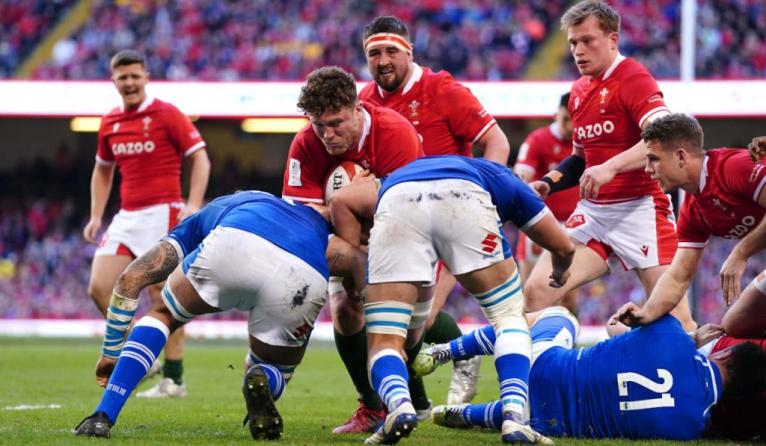
Tshiunza made his test debut at the age of 19, having only played four times for Exeter, and while still turning out for the Exeter University side. There’d been a theory doing the rounds that Pivac wanted to cap him early to prevent England or France sinking their claws into him. Four months on, Christ says there was never a cause for concern. “It was always going to be Wales. I got a lot of stick from the boys here (in Exeter) because of that, but realistically had I gone to live in France, would I even have played rugby? Wales got me into rugby; I played rugby because of Wales. It would make no sense for me to play rugby for England or France. Singing the English or French national anthems wouldn’t mean anything to me. The Welsh national anthem actually means something to me – my school, my friends, and my family.”
I’d heard how he likes to test people’s character and see what type of person they are, so he sat there with his hood up and didn’t say anything for a good fifteen minutes
Christ Tshiunza on his first encounter with Alun Wyn Jones
Given his status as a late bloomer, he didn’t hero-worship any of the senior players in the way others night have, but he was still a little starstruck when he first arrived in Wales camp. It was a Sunday when he checked in at the Vale Hotel, and all the players bar one had returned home for the weekend. He was enjoying a quiet evening meal with the fitness coach, Paul “Bobby” Stridgeon, when a brooding, hooded figure approached their table without saying a word. Although his face was shrouded by the hood of his training top, it was obvious from his bearing and size that it was Alun Wyn Jones. “I’d heard how he likes to test people’s character and see what type of person they are” he says. “So he sat there with his hood up and didn’t say anything for a good fifteen minutes. He was just waiting for me to say something to him. I could tell he was thinking, ‘who’s this young kid?’ Bobby’s quite loud and did his best to break the ice, cracking jokes and saying, ‘what’s going on Al? Are we at a funeral, or what?’ When I eventually spoke I felt like I was speaking to my teacher and that I’d done something wrong. If Bobby hadn’t been there, Al probably wouldn’t have spoken at all.” After that somewhat surreal introduction, the rest of the boys returned en masse, and Christ quickly developed an unlikely bromance with Liam Williams who took him under his wing and welcomed him into the fold.
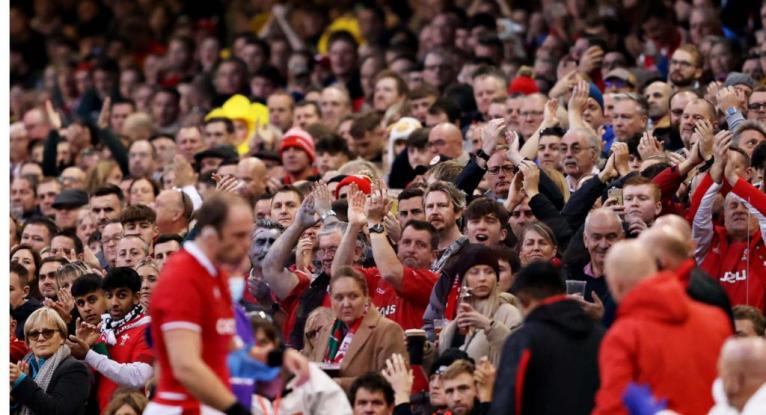
Tshuinza made his debut off the bench against Fiji, and enjoyed another cameo against Australia the following week. It was during the tense final moments of that game that he made a despairing tackle on Kurtley Beale that may well have altered the outcome. The nation’s hearts would have collectively sunk when Beale hitch-kicked his way into open space, so often had he been the architect of last-gasp victories over Wales. The Wallabies were two points ahead with two minutes to play, so when Tshiunza scythed him down, forcing him to spill the ball, it was a pivotal moment. “It was just a tackle wasn’t it?” he now says, self-deprecatingly. “He’s a very fast player and I didn’t think I’d catch him, and afterwards, I looked back and thought, ‘how on earth did I do that?” When you consider that Beale is one of the most elusive broken field runners in the world game, and Tshiunza is 6’6” and a shade under eighteen stone, it’s even more remarkable.
The turnover allowed Wales to launch a counter attack which led, eventually, to a Rhys Priestland penalty, and victory. It should have been dream territory for Tshiunza, but the perfectionist in him wasn’t entirely happy: “even at that point, I was thinking I should have caught him before he kicked it. I know he scuffed the kick a bit, but I wasn’t satisfied. I could have caught him that one step earlier, before he put his foot on the ball.”
It’s weird; I used to watch Joe Launchbury highlights on YouTube and stuff, and I ended up lining up against him for my Premiership debut.
Rugby obsessive Dafydd Jenkins
Tshiunza was desperate to kick on during the Six Nations, and found watching from a distance a frustrating experience. “We’ve got a lot of creative players in that squad, but it felt like we were just waiting for someone to do something, to create something, just a little half break. Pivac is still in his building phase. He hasn’t got all his bricks together yet. He’s still finding out who plays well with whom, who complements whom.”
Dafydd was an equally frustrated observer, unable to take part in the U20s campaign for two reasons: first, because Exeter needed him, and second because he injured his shoulder playing against Northampton. While keen to build on the promise shown during last year’s campaign, he reflects that his stint in the Premiership was probably more beneficial. “I got to test myself against the best” he says. “It’s weird; I used to watch Joe Launchbury highlights on YouTube and stuff, and I ended up lining up against him for my Premiership debut. Then we played against Gloucester who have the best maul in the league, so (I learned) how to cope with that. On both occasions, when I walked out of the tunnel, I just thought, ‘come on then, let’s see if I’ve got it.’ We lost against Wasps, but won the next three, and that gave me a lot of confidence because I realised I belonged there.”
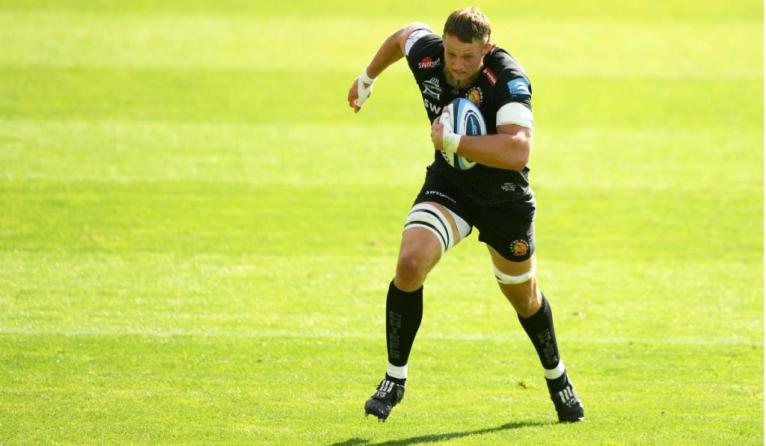
Those four consecutive starts came because Jonny Gray, Jonny Hill, and Sam Skinner were all away on Six Nations duty, but with two of them departing next season, Jenkins saw it as an important audition. While they’re still at Sandy Park, he intends to soak up every bit of wisdom and experience he can. “That’s one of the reasons I came down here; to learn from all those quality players in the squad. I’m looking at all these different second rows, looking at what they do best and trying to add it to my game. It’s a real pleasure working with them, watching how they call line-outs, even stuff like how they do their recovery. There’s a culture here where anyone can ask anything and not look stupid. I want to come off at the end of every session having worked harder than them. Everything I see them doing in training now, I make sure I do one more. You just want to have the one up on them.”
What this year has taught me is that nothing is impossible. I played about six or seven games on the bounce for Exeter, and went on to play for Wales
Christ Tshiunza
Looking to the future, both players are both hoping to pull on the red jersey again in the coming months. Jenkins is hoping the U20s will arrange a summer tournament, and Christ is desperate to face the World Champions in South Africa. The confidence of youth is infectious, and if he feels remotely nervous about the prospect, his manner doesn’t betray it. “When I left (the Six Nations camps), I said ‘hopefully I’ll be back soon’, and they said, ‘don’t worry you will be.’ I’m holding on to that. We’ve based my rehab around being fit for the summer tour.” At a time when the whole of Wales appears to be engaged in yet another bout of hand-wringing misery about the state of the game, his optimism and enthusiasm is a refreshing tonic.
Addressing Wales’ meek title defence, he is defiant: “no one’s going to remember this Six Nations performance if he (Pivac) wins the World Cup.” There’s an important distinction here. Pivac made a similar sounding declaration in the wake of the Italy defeat, but spoke of reaching the knock-out stages as opposed to the winning the whole thing. It drew ire from Welsh fans who considered it defeatist, even regressive, in tone. Asked if winning the World Cup was a possibility, Tshuinza replies, “What this year has taught me is that nothing is impossible. I sat down with the coaches here last August to talk about my goals for the season. I said ‘play rugby and hopefully get at least one game for the boys.’ After that conversation I played about six or seven games on the bounce for Exeter, and went on to play for Wales.” He pauses for a moment, allowing that though to settle, before repeating, with conviction, “Nothing is really impossible.”



Comments
Join free and tell us what you really think!
Sign up for free